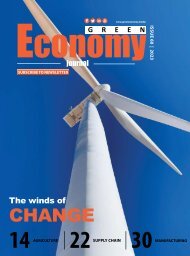Green Economy Journal Issue 63
You also want an ePaper? Increase the reach of your titles
YUMPU automatically turns print PDFs into web optimized ePapers that Google loves.
FINANCE<br />
FINANCE<br />
IMPACT INVESTMENT<br />
providing capital to address the<br />
world’s most pressing challenges<br />
<strong>Green</strong> <strong>Economy</strong> <strong>Journal</strong> speaks to Mike Adsetts, CIO at Momentum<br />
Investments, about impact investment, the strategy that generates<br />
positive, measurable social and environmental impact while also achieving<br />
acceptable financial returns.<br />
How does impact investing work?<br />
A common starting point for implementing impact investing in<br />
practice is the United Nations’ Sustainable Development Goals<br />
(SDGs). The member states of the United Nations adopted the<br />
17 SDGs with 169 targets in 2015 as part of the 2030 Agenda for<br />
Sustainable Development. These goals form part of an extensive<br />
globally coordinated action plan to end poverty and reduce<br />
inequality, while also protecting the planet, tackling climate<br />
change and spurring economic growth. The goals recognise that<br />
social and environmental issues affect everyone and thus apply<br />
to every country, irrespective of their “developed” or “developing”<br />
economic status. Sustainable development embodies the idea of<br />
doing well by doing good.<br />
Impact investing includes profit as one of its main objectives, so<br />
while there is a commitment to social and environmental impact,<br />
investors still earn a market rate of return.<br />
What are the benefits of impact investment?<br />
Impact investments should form part of your investment portfolio<br />
because of the following benefits:<br />
Diversification benefits. The investments are more likely to be<br />
unlisted, private market assets, so they won’t move in tandem with<br />
public market assets. Risk and return drivers are also different to<br />
Mike Adsetts, Chief<br />
Investment Officer,<br />
Momentum Investments.<br />
public market assets. Assets in regulated industries provide stable<br />
cashflows even through times of economic weakness.<br />
Alternate sources of return. There would typically be an illiquidity<br />
premium embedded into these assets, which a holder would be able<br />
to access over the long term. Additional returns to equity holders<br />
through balance sheet refinancing is also a common occurrence<br />
in infrastructure projects.<br />
Inflation hedge. Revenues generated by underlying investments<br />
are adjusted by an inflation factor, which benefits investors. In<br />
addition, concession agreements and other off-take agreements<br />
are long-term, meaning greater cash flow certainty.<br />
Demonstrable positive impact and financial returns. This<br />
investment would provide a physical infrastructure that would be<br />
of economic utility. There would be measurable outputs from each<br />
project in terms of positive societal impact.<br />
Why integrate ESG factors into investing?<br />
We define responsible investing (RI) as an investment process<br />
that includes ESG factors into our process. <strong>Issue</strong>s like increasing<br />
regulation, the growing need for risk mitigation and a heightened<br />
social conscience can be addressed by integrating ESG factors<br />
into our investment process. We acknowledge that we are<br />
in a privileged position to act as fiduciary to our clients and<br />
stakeholders. We consider the ESG risk of our investments to be<br />
relevant to the performance of the overall objective – across all<br />
asset classes, sectors, markets and through time.<br />
This is an approach to investment that explicitly acknowledges<br />
the relevance to the investor of ESG factors and of the long-term<br />
health and stability of the market. It recognises that the generation<br />
of long-term sustainable returns is dependent on stable, wellfunctioning<br />
and well-governed social, environmental and economic<br />
systems. We ensure ESG integration through various governance<br />
structures within our business.<br />
How do ESG factors impact a company’s value?<br />
Each of the factors can affect companies in different ways and can<br />
be integrated into an evaluation approach. For example, carbon<br />
emissions can be measured and potential carbon tax liabilities<br />
factored into a company valuation.<br />
Other factors are nuanced and may require a more judgemental<br />
approach. Governance risks and the red flags around them need<br />
to be considered. The famous example here is Steinhoff and how<br />
the governance failures led to a dramatic destruction of value.<br />
The hardest ones to quantify tend to be social factors and once<br />
again a qualitative impact perspective can be considered.<br />
How should investors approach responsible investing?<br />
Investors can do research on the investment managers to see if<br />
they uphold the principles of RI. At Momentum Investments, we:<br />
Advocate. We participate in market-related industry events and<br />
serve on the responsible investing committee of the industry body<br />
the Association of Savings and Investments South Africa (ASISA).<br />
Report on progress. We show investors that we take our duty to<br />
act in their best interests to heart by publishing our poxy history,<br />
our stewardship report, and our responsible investment and climate<br />
change investment policies, among others.<br />
Seek disclosure. We have a register that shows how we engage<br />
with companies that we invest in to keep them accountable.<br />
Are active owners. We use our influence to help maintain a<br />
well-governed corporate South Africa.<br />
Integrate ESG. We have a responsible investing committee that<br />
serves as an oversight function of responsible investing practices<br />
across the investment team. We follow an integrated ESG approach<br />
across all our asset classes.<br />
Have integrity. We keep to and observe all rules and regulations<br />
which seek to uphold the principles of responsible investment.<br />
Sustainable development embodies<br />
the idea of doing well by doing good.<br />
How do investors assess impact?<br />
By incorporating social and environmental targets into their<br />
investment strategies, investors can align their impact objectives<br />
to the SDGs and track their contribution towards achieving these<br />
goals. Using metrics that reflect their effect on specific SDGs,<br />
investors can address how they are contributing to a sustainable<br />
and equitable future.<br />
What are the key barriers and opportunities in impact investing<br />
in South Africa?<br />
There is a huge need for impact investing with considerations like<br />
levels of liquidity, deal availability and size, and role players involved<br />
needed to be considered. There is still a lot of work that needs to<br />
happen to increase trust levels between the public and private<br />
sectors with Public Private Partnerships (PPPs) still not finding<br />
significant traction. All of this has resulted in relatively limited deals.<br />
When these barriers are overcome, there will be increasing<br />
opportunities in energy, logistics and water infrastructure.<br />
ESG GOVERNANCE AND ORGANISATION<br />
Chief sustainability officers from some of the world’s largest<br />
companies were interviewed for KPMG’s global survey on ESG<br />
governance and organisation, to gain a deeper understanding<br />
of how companies are structuring their set-up and teams for<br />
sustainability and responding to a wave of new regulation and<br />
increased pressure for transparency on ESG. Almost all respondents<br />
reported high ambitions for ESG in their organisations, with half<br />
now viewing sustainability as a strategic issue that is embedded<br />
in core business operations. With ESG covering a wide area of<br />
societal and governance issues, the challenge for many businesses<br />
can be deciding what to prioritise. Decarbonisation and the race<br />
to net zero were the topics most often included in their corporate<br />
ESG strategy, with diversity, equality and inclusion and human<br />
rights in the value chain as the next most-mentioned theme.<br />
Who leads on ESG?<br />
The question now facing many business leaders is who should<br />
make the ultimate decision on ESG as it increasingly becomes<br />
embedded in a company’s fabric. The CEO is responsible for<br />
sustainability in almost half of the organisations surveyed, with a<br />
dedicated chief sustainability officer as the second most popular<br />
option. The remaining respondents revealed a wide variety of<br />
roles taking charge of ESG – from head of supply chain and<br />
manufacturing to the chief risk officer.<br />
Rising regulation<br />
Reporting on ESG has generally been a voluntary exercise. Still,<br />
some jurisdictions are in the process of making it compulsory, most<br />
significantly the EU through its Corporate Sustainability Reporting<br />
Directive (CSRD). Nearly half of the researched organisations plan<br />
to report under CSRD for the 2024 financial year, with nearly a<br />
fifth more planning to do so in 2025.<br />
Nearly three-quarters of organisations in this research have<br />
six or fewer full-time equivalent staff working on non-financial<br />
reporting, and more than half have three or fewer. Just over half<br />
expected to see an increase in this number, with the remainder<br />
anticipating numbers to stay the same.<br />
Just under half of the organisations in this research have ESG<br />
topics in their core corporate key performance indicators (KPIs),<br />
with more than a quarter including them in management-level<br />
performance reviews.<br />
Almost half of the organisations interviewed produce internal<br />
indicators every quarter and several use monthly reporting<br />
for certain measures. Annual is the most common frequency<br />
for external reporting used by more than three-quarters of<br />
organisations, with the remaining respondents doing so quarterly.<br />
ESG KPIs are used in calculating executive pay in most of the<br />
organisations researched, with just over half using these for<br />
short-term and two-fifths for long-term incentives. Just under<br />
half have between 16% and 25% of variable executive pay linked<br />
to ESG indicators.<br />
12 13

















